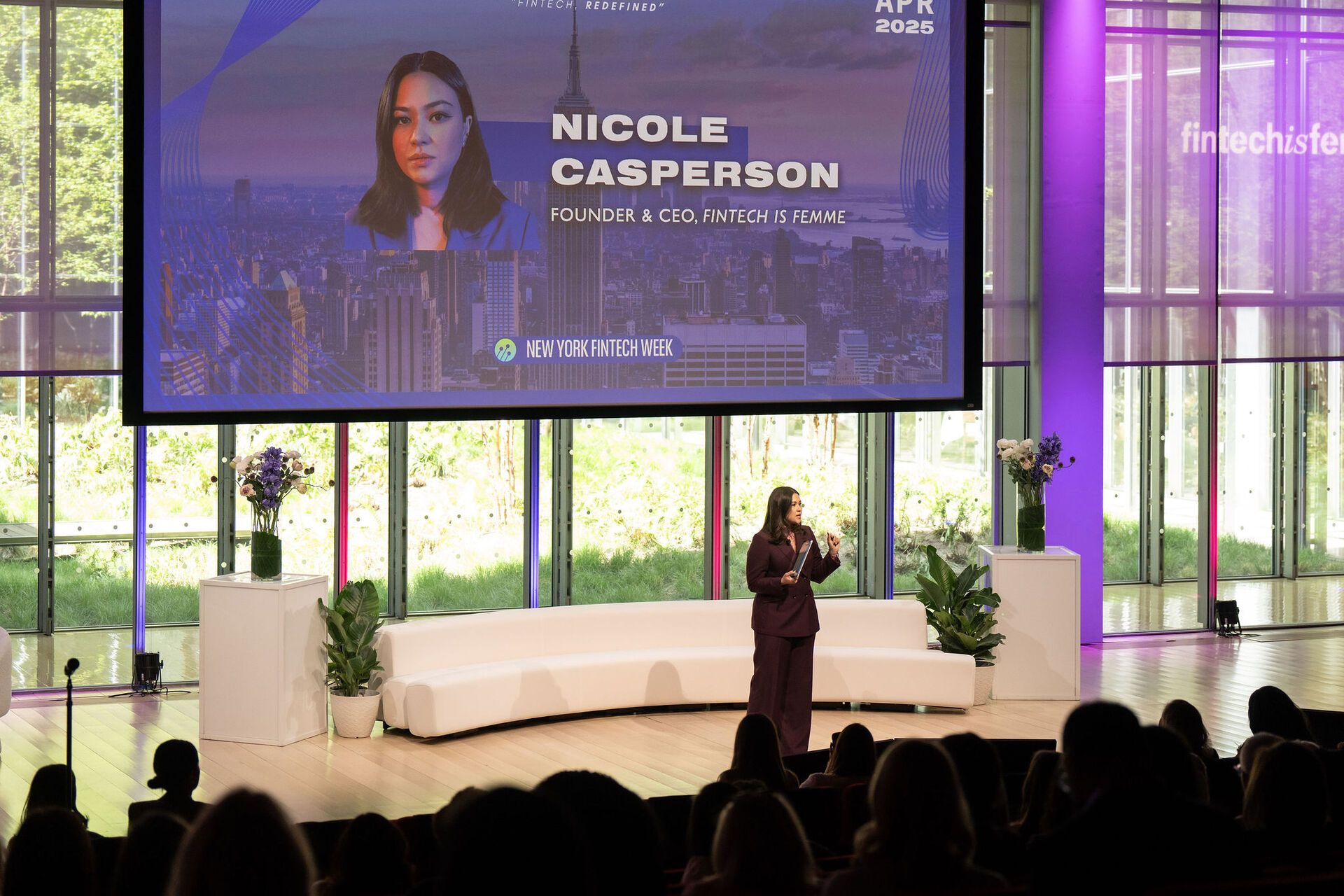- Fintech Is Femme
- Posts
- 🤑 AI Is Everywhere
🤑 AI Is Everywhere
But Who’s Leading the Shift in Fintech?

Hi fintech fam 💜
One of the most common questions I get from this community:
“Do you have a list of female-led fintech companies hiring?”
Here’s why that matters:
This audience isn’t just readers — you’re the most talented operators, founders, and execs in fintech. You love the industry. But too often, the companies you’re at don’t align with why you joined fintech in the first place.
And for most of us, that why is simple:
⚡Speed + execution of startups. A mission rooted in access + inclusion. Proof that fintech can create wealth for the masses and build massively profitable businesses
Or—you’re a female-led fintech looking to build the strongest team possible.
That’s the gap I’m closing. So I’m launching something new:
✨ The Official Fintech Is Femme Hiring List ✨
Think of it like your insider board for the most mission-driven jobs in fintech. Not the same recycled postings you’ll find on LinkedIn — but the list of roles at female-led fintechs (and female-led teams inside fintech) where values and ambition actually align.
Only companies in our circle will be featured. Only the sharpest operators will see it. It’s exclusive by design.
If your fintech is female-led and hiring, reply to this email to claim your spot on the list.
Now, let’s get into today’s column. Because honestly? I’ve been feeling extra spicy about the state of women’s narratives in fintech — especially around AI. While the boys’ club echo chamber (IYKYK) does the same old, we’re building something new, bigger, stronger, louder, and smarter.
Women literally built the language that powers our tech. If we let history repeat, we risk an AI economy that fails all of us. I say: let’s rewrite the story, together.
INNOVATION
AI Is Everywhere — But Who’s Leading the Shift in Fintech?

Opening the show at the Fintech Is Femme Leadership Summit in New York, April 23, 2025. (San Francisco, we’re coming for you!)
AI. It’s everywhere.
It’s in our feeds, our inboxes, every board deck, every VC pitch.
We’ve got AI for marketing. AI for productivity. AI for compliance. AI for content. And, of course, AI for fintech.
But here’s the question nobody asks: what does AI in fintech actually mean?
Is it just automation duct-taped on top of outdated infrastructure (AI slop)?
Or can it actually build new financial systems — ones that expand access to wealth, credit, and opportunity instead of just optimizing what’s already broken?
That’s the conversation fintech needs to have. And right now, women leaders are showing us what the future could look like.
The State of AI in Fintech
The market opportunity for AI in fintech is, not surprisingly, substantial.
The global market size is projected to reach $53 billion by 2030, driven by key growth factors including personalization, fraud prevention, and operational efficiency.
Today’s “AI in fintech” wins are real but incremental.
Faster underwriting.
Smarter fraud detection.
Friendlier chatbots.
Important, yes — but not transformative.
Like I wrote last week, AI is powerful at surfacing data. But the work of contextualizing it — making meaning from noise — is still very human. For now.
The deeper opportunity is systemic.
It’s not about shaving seconds off a loan approval. It’s about building financial systems that finally include the people who have been excluded for decades.
That’s the difference between AI as a shiny feature and AI as an infrastructure shift.
This Isn’t New — Women Built the Rails

Let’s remember: the story of AI tech itself has women at its foundation.
Grace Hopper literally invented compilers. She wrote the language that let machines talk to humans. Her work pioneered the idea that computers could translate higher-level, English-like commands into machine-readable code, making programming far more accessible and leading to the development of modern programming languages.
Without her, modern computing wouldn’t exist.
But history rarely gives women their credit. And in AI — the most important technology wave of our time — the risk is that history repeats.
And when it does? We already know the outcome: slower progress, biased systems, and an economy doomed to fail all of us.
The Women Already Building the Future
Few founders articulate that AI-driven systemic shift better than Shivani Siroya, CEO of Tala.
Her company has disbursed more than $6 billion in credit to 11 million customers across Africa, Mexico, India, and the Philippines. One million of those customers joined in the first half of this year alone.
Now Tala is using AI to expand underwriting — leveraging smartphone data, repayment patterns, and behavioral signals to reach borrowers the FICO system ignores.
As Siroya told me in our Fintech Mavericks Season 2 finale (episode out Sept. 10):
“When I started Tala, I didn’t even realize I was building a company at first,” she told me on Fintech Mavericks.
“I was lending unconsciously — but I had real data behind it and a real reason to believe in this population, which we call the global majority. That’s about 4 billion individuals who’ve been underestimated by traditional financial institutions. And that represents a $10 trillion market opportunity.”
Her early aha moment came from following a woman named Seema in Chennai, India.
Seema was a tile maker — but also ran three side hustles out of her shop, from selling bindis to planning weddings. Siroya sat in her store, counted her cash, followed her to the marketplace, and watched her operate as a true entrepreneur.
“She had the consistency, the credibility, the hustle. But every time she went to the marketplace for credit, she was turned away,” Siroya recalled.
“Not because she wasn’t worthy — but because she didn’t have the paperwork. That’s when I realized: I can’t lend to everyone myself. This has to scale. We need a platform that uses alternative data to prove the potential of the global majority.”
That story became Tala. Today, the company’s scale and business model prove that an AI-driven infrastructure overhaul, inclusion, and scale aren’t mutually exclusive.
AI for Access — Not Just Efficiency

Shivani Siroya, Founder & CEO, Tala
This isn’t AI for convenience. It’s AI for access.
Tala is now using behavioral and smartphone data to underwrite thin-file borrowers: call patterns, cash flow proxies, and repayment behavior.
“We don’t want to create another black box,” Siroya said. “That’s why we pair data science with human research. You need user researchers in the market asking: What’s the context here? What stories sit behind the data? Otherwise you risk embedding bias instead of removing it.”
One example: a model flagged the number of vowels in someone’s name as predictive. “We realized that correlated to tribal communities or rural areas — and it created bias. So we removed it. Our mission is to lend to the global majority, not exclude them further.”
This is what AI for access looks like: not blindly optimizing, but carefully designing models that expand inclusion while staying accountable to ethics.
It’s painstaking work. You can have tons of data and still get garbage models. It’s all about the quality of the data and ensuring you’re not creating algorithmic bias.
That’s why Tala overhauled its data architecture in 2020.
“We needed proprietary data, generated in real time from our customers’ behavior, so we weren’t dependent on flawed external datasets. That’s what makes us move faster today.”
Other women are pushing in equally powerful ways:
Alinea Invest (Eve Halimi & Anam Lakhani) — AI-driven investing tools built for Gen Z and first-time women investors. They cut through jargon and deliver plain-language portfolio strategies. It’s wealth management without the velvet rope.
GoodFin (Anna Joo Fee) — a platform that provides high-earning women with access to private markets, opportunities typically reserved for the 1%. But GoodFin is more than a platform. It’s a signal that fintech is finally shifting from access to ownership.
Lucy Guo (Scale AI, Passes) — After building one of the most important infrastructure AI companies, Scale AI, she’s now tackling the creator economy. Passes is building creator-centric financial rails powered by AI — proving that entire new categories of entrepreneurs can get better financial infrastructure if you design with them in mind.
FoundHer House (San Francisco) — a rare, women-only AI hacker house where eight women co-live and code together. Ava Poole, 20, is already building an AI agent for digital payments.
It’s an intentional rewrite of AI’s gender story, happening in real time.
These aren’t “edge cases.” They’re the blueprint for what AI in fintech should be.
The Gender Gap We Can’t Ignore

Anna Joo Fee, Founder & CEO, GoodFin, an AI-driven wealth tech platform
And yet.
According to PitchBook, fewer than 20% of AI startups funded this year have a woman founder.
That means the lens-shaping AI in fintech — including credit, fraud, payments, and wealth — is still overwhelmingly male.
Just look at the names associated with AI today: Sam Altman. Jensen Huang. Dario Amodei.
Meanwhile, women leaders like Navrina Singh (Credo AI), Fei-Fei Li (World Labs), Mira Murati (Thinking Machines Lab) are treated as exceptions, when they should be the rule.
Even AI hacker houses are dominated by men — unless women carve out their own spaces.
If the next generation of credit scoring, fraud detection, and wealth building is coded without women at the table, the system will simply replicate the exclusions of the past — faster, at scale, and under the guise of objectivity.
The good news is that we are not letting that happen.
As Siroya said:
“With technology, exclusion can happen faster. So to actually move fast, you have to listen more intently. You have to understand why these problems exist in the first place — and build systems, not band-aids.”
That’s not just a founder insight. It’s a warning.
Where AI Can Actually Deliver Access
McKinsey estimates AI could unlock up to $1 trillion in value for global banking annually. But most of that is efficiency — cost-cutting, speed, automation.
That’s important. But it’s not transformative.
The transformation comes when AI rewrites the rules of access.
Credit scoring beyond FICO. AI can underwrite using alternative data: rental payments, cash flow, and even mobile phone usage. Suddenly, immigrants, women, and thin-file borrowers aren’t invisible anymore.
Fraud detection that doesn’t punish the vulnerable. Instead of freezing grandma’s account for sending money abroad, AI can flag coordinated fraud rings at scale.
Wealth-building tools that democratize advice. Imagine a multilingual financial coach powered by AI, guiding first-time investors through their first trades — not just serving the already wealthy.
This is where the real fight is. Not how AI makes the top 1% wealthier. But how it finally pulls more people in on fair terms.
Why This Matters Now
AI isn’t just a tech wave. It’s an economic rewiring.
And fintech has too much at stake to let the same old voices dominate.
If AI is integrated into financial systems — from credit scoring to fraud prevention to wealth management — without women and diverse leaders shaping it, we’ll simply recreate the inequities of the past.
That’s why we built the Fintech Is Femme Leadership Summit: AI Edition.
On October 8, during SF Tech Week, we’re gathering 200 of fintech’s boldest founders, investors, and operators. Not another hype-driven AI conference. But tactical frameworks, unfiltered conversations, and women leading the story.
Speakers include:
Sibongile Ngako, Chief Compliance Officer, Brex
Asya Bradley, VC Partnerships Lead, Stripe
Drew Glover, Co-Founder and GP, Fiat Growth/Fiat Ventures
Anna Joo Fee, Founder & CEO, GoodFin
This isn’t about AI slop. It’s about scaling, raising, and leading in the age of AI — with women at the mic and frameworks you won’t hear anywhere else.
Because to change the story of AI in fintech, we need to change the storytellers.
🔥 Early bird tickets are live now. Only 10 left. Once they’re gone, they’re gone.
AI is rewriting money. The only question is: who gets to write the story?
On October 8 in San Francisco, the answer is us.
Stripe, Brex, Middesk, and Goodfin are already co-hosting with us. We already have top leaders and founders registered.
Want in? Apply to join us or reply to this email if you want to co-host this epic event with us and place your company at the center of AI innovation in fintech.
I WANT IT, I GOT IT
🎧 Today’s Listen: Last week on Fintech Mavericks, I sat down with Cindy Gallop, advertising icon, founder of Make Love Not Porn, and now fintech disruptor, to unpack her fearless journey of breaking rules, challenging stigma, and building businesses no one else dared to. Tune in here or wherever you get your podcasts. And if you’re a Fintech Mavericks listener — Brex built a special sign up offer just for you. Check it out here.
🚀 Today’s Growth Hack: Loved watching this fireside chat with Tracee Ellis Ross on Building a Life of Joy. As an entrepreneur, a builder, and a woman navigating both my career and building alongside my partner, it’s been deeply resonant — and a reminder that joy isn’t a luxury, it’s part of the work.
🧘♀️Today’s Self-Care: The Academy of Fintech is now nearly 200 members strong — a private community of founders, operators, and investors shaping what’s next in finance. Every month, we host 2x virtual events that get straight to the real talk — plus, this fall, we’re adding private member gatherings to take the conversations even deeper. Whether you’re fundraising, navigating growth, chasing product-market fit, or hiring your first (or fiftieth) team member, this is where the sharpest minds in fintech come together. Think: peer support, behind-the-scenes playbooks, and live sessions with the folks actually doing the work. Sound like your crew? Apply to join us here — we’d love to meet you.
#SPONSORED
From Italy to a Nasdaq Reservation
How do you follow record-setting success? Get stronger. Take Pacaso. Their real estate co-ownership tech set records in Paris and London in 2024. No surprise. Coldwell Banker says 40% of wealthy Americans plan to buy abroad within a year. So adding 10+ new international destinations, including three in Italy, is big. They even reserved the Nasdaq ticker PCSO.
Paid advertisement for Pacaso’s Regulation A offering. Read the offering circular at invest.pacaso.com. Reserving a ticker symbol is not a guarantee that the company will go public. Listing on the NASDAQ is subject to approvals.
FINTUNES
Not the direction I expected our girl to go, but I’m lovin’ the ’80s pop vibes.

LET’S CONNECT
📰 Share this newsletter with a friend and start growing your network.
🔗 Connect with me on LinkedIn for daily insights on female leadership.
🤝 Grow your business through content & community by partnering with me.
📣 Promote yourself to 50,000 subscribers by sponsoring this newsletter.
🎤 Host an epic event by booking me as a speaker, moderator, or emcee.
📚 Increase your expertise by ordering your copy of my book, Fintech Feminists: Increasing Inclusion, Redefining Innovation, and Changing the Future for Women Around the World.
That’s all for now! See you Thursday!
Love,
Nicole 💜


